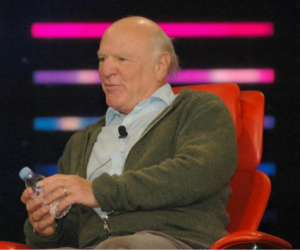Barry Diller: The Internet 'Absolutely' Will Become a 'Paid System'. Time Projection: Within 5 Years


The only missing link, according to Barry Diller, who cut his teeth building up over-the-air and cable TV networks: a good billing system, akin to Amazon’s “one-click” button or the Apple iPhone’s slick downloading of paid applications.
“I absolutely believe the Internet is passing from its free days into a paid system. Inevitably, I promise you, it will be paid,” Diller said in a keynote discussion opening up the Advertising 2.0 conference held at his company’s futuristic glass building alongside the Hudson River in Manhattan. “Not every single thing, but anything of value. “
The fact that content and services on the Internet so far have been largely supplied for no charge is “an accident of historical moment that will be corrected,” he said, in an era of “creative chaos” that will span the next three to five years.
So far, news, content and service suppliers were “afraid of not being dinosaurs and slapped everything up on the Internet for free,’’ he said, in an interchange with BusinessWeek media columnist Jon Fine.
But, that will be change. The New York Times, for instance, likely will have to go beyond the “pay wall” in order to cover the cost of its worldwide reporting corps, even if it means having 1, 2 or 3 million paid subscribers, instead of 20 million unique visitors a month. And people will pay – if it is quality they’re buying.
“People have paid for content,’’ he said. “They always have.”
IAC’s Match.com, a dating service, already charges subscription fees. IAC also operates Ask.com, the search service, UrbanSpoon, one of those iPhone apps, Citysearch, a local information service, and The Daily Beast, a content site headed by former New Yorker editor Tina Brown.
Inevitably, Diller said, the “base model” of the Internet will be paid, at the end of the chaos. The forms will include not just subscriptions and individual one-time purchases, but rapid-fire micropayments and other mechanisms. The early examples: Amazon’s “one-click” system, where a customer enters billing address and credit card information in advance. Then, a button on the screen for a shopping cart is pressed once and the purchase or purchases associated with that cart are confirmed, billed, paid for and delivered.
Similarly, with the App Store for Apple’s iPhone handheld computing and communication devices, “the real trick and key is the billing system and the way of doing it is absolutely a blink,’’ he said.
The right billing system, broadly applied, would remove “one of the greatest bars of buying anything” which “is the steps it takes” to complete a purchase.
The entire Internet, in effect, would become an app – or content – store.
And given the movement of ad and subscription revenue to the Internet, “people who manufacture that content will have no alternative,” he said.
The biggest disruptor? When broadband pipes to the Internet are connected to large screens in living rooms around the world and users are interacting with its increasingly video-based content with a remote control.
At that point, television, radio and prior media founded on scarcity, like limited spectrum whose use is overseen by governments, “will be run over by this much more open, much much less controlled (medium) that is not based on scarcity, but based on unbelievable plenty,” Diller said